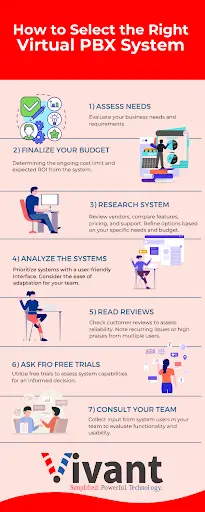As your company grows from a startup to a successful business, you’ll need to set up phone connectivity for your employees. You may start looking into Private Branch Exchange (PBX) systems for this purpose.
This guide explains all the key information about modern PBX solutions. Even if you have no prior experience with PBX management, you can easily navigate to the sections that are relevant to you.
What is a PBX?
A PBX, which stands for Private Branch Exchange, is an internal telephone network that enables users to communicate with each other. It handles phone functions such as incoming and outgoing calls, call forwarding, voicemail, and more. The system comprises various hardware components that facilitate voice communication with the public telephone network.
PBXs manage a company’s internal telephone system and facilitate communication with the external world, including call routing and advanced features for inbound and outbound calls.
The role of a PBX
A PBX primarily functions as a business phone system.
It enables the internal management of phone calls within a limited area, such as an office or business setting. A PBX can provide features such as voicemail, auto attendants, and recorded messages, creating a comprehensive phone system for the company.
On the other hand, the PSTN (Public Switched Telephone Network) is a public phone network that facilitates calls between different providers and manages call routing on a larger scale. It is not tailored for internal business phone systems like a PBX.
PBX systems allow IT leaders to maintain their current devices using an all-digital infrastructure by assigning distinct business phone numbers to various extensions. Alternatively, a cloud PBX combines the advantages of both worlds by offering a fully managed phone system deployment.
Now that we understand the role of a Private Branch Exchange, let’s explore the advantages of a modern PBX for business communications.
Benefits of a PBX Phone System
There are numerous benefits to implementing a PBX phone system for your business. Here are some advantages of a PBX telephone system:
1. Call Scheduling
With PBX phones, you can manage calls according to a set schedule. Additionally, a PBX system allows you to determine how calls are routed. In essence, a PBX phone system lets you establish rules for call routing and timing. Moreover, PBX phones enable you to restrict international calls to save costs.
2. Interconnecting Multiple Office Locations
For large organizations with multiple departments, meeting in person is often impractical. However, with a PBX telephone system, you can connect to different office locations. PBX phones serve as an internal calling network that facilitates instant communication among employees in various departments.
3. Decreased Call Drop Rates
A key advantage of a PBX phone system is the reduction in call drop rates. It automatically directs calls to the next available support agent or employee, ensuring prompt responses for callers. Additionally, an online management portal allows you to view staff availability and efficiently transfer calls to the appropriate individual.
4. Managing High Call Volumes
PBX telephone systems can handle numerous calls simultaneously at a lower cost. Calls are identified and directed to available agents, significantly reducing call drop rates. Furthermore, calls are distributed among many employees based on caller preferences.
5. Remote Work Adaptability
Virtual PBX systems are essential in the era of remote work. Companies need to be flexible while maintaining connectivity and professionalism. These systems facilitate seamless communication from anywhere with an internet connection. Embracing remote work expands a company’s talent pool and reduces office space costs. Cloud PBX systems offer significant advantages in this regard.
6. Improved Customer Support
Utilizing a virtual PBX service enhances customer support efforts. Features like automated routing reduce the time required for callers to connect with the appropriate representatives. Enhanced customer support is vital for reputation and business success. Many virtual PBX systems also include voicemail-to-email functionality, converting voicemails into emails and sending notifications to customer support for quicker and more efficient responses.
7. Call Analytics Access
Virtual PBX software provides companies with access to call analytics. The system gathers data on call volume, duration, sources, and more. Understanding call origins is particularly crucial.
8. Scalability
Virtual PBX solutions are easily scalable. Small businesses can incrementally add new lines to their subscription plan as needed. The process is straightforward, involving account upgrades, unlike traditional systems that require physical hardware installations.
Features of a PBX Phone System
Unlike a traditional telephone network, PBX phones offer various features such as call routing, digital portal management, auto attendant, call holding, virtual presence, and more. Let’s explore each of these features:
1. Call Routing
Call routing enables businesses to direct incoming calls to the next available agent. With a phone system, calls are automatically directed to the available customer support agent or employee, resulting in reduced wait times and improved communication.
2. Digital Portal Management
Digital portal management, a component of virtual PBX phones, involves managing specific phone-related tasks through an online dashboard. Tasks may include creating call routing paths, setting up SIP trunks, adding new handset extensions, configuring ring groups, and more.
3. Auto Attendant
While employees or support agents are typically assigned customers based on availability, the auto attendant feature allows callers to choose the employee they wish to speak with. The auto attendant offers various options for callers to filter staff members and direct their calls to the appropriate individual or department.
4. Emergency Call
The emergency call feature of a PBX (Private Branch Exchange) system allows users to make emergency calls directly from their phones, without the need for a separate operator to connect them. This is especially important for medical or emergencies where quick action is needed.
5. Virtual Presence
Virtual presence enables employees to view the availability status of their colleagues for handling inbound calls, indicating whether they are busy or offline. This feature ensures that phone calls are routed to the most suitable person.
6. Call Recording
Select a virtual PBX system that includes call recording functionality. This feature enables businesses to record and store phone calls, which can be used for quality monitoring, training new employees, resolving disputes, understanding purchasing patterns, and identifying effective sales strategies.
7. Call Tracking
Call tracking allows businesses to trace the sources of incoming calls by assigning specific numbers to different marketing channels. This data helps marketing teams measure and prioritize channels, optimizing the marketing budget for a competitive edge.
8. Queuing
In situations where there are more calls than representatives available, queuing features prevent callers from disconnecting. The virtual PBX system places callers on hold with messages or music, and some systems provide estimated wait times.
9. Customized IVR
Interactive Voice Response (IVR) greets callers with an automated menu system, allowing them to navigate options using voice commands or keypad inputs. IVR enhances professionalism, efficiently directing customers to their desired destination and building the company’s reputation.
10. Mobile and Desktop Apps
A comprehensive virtual PBX system should include mobile and desktop apps for managing messages, notifications, communication channels, settings, and analytics. Look for a user-friendly platform to streamline operations.
Types of PBX Phone System
If you are considering a private branch exchange phone system, there are different types available for your company to choose from.
Analog PBX Phone System
The analog PBX phone system is the traditional office telephone system that has been in use for many years. It is connected through Plain Old Telephone Service (POTS) lines to the public switched telephone network (PSTN). This system handles phone calls and fax transmissions using physical phone lines within the office. It allows for making and transferring calls within the office premises and manages incoming and outgoing calls through external lines.
It’s important to note that analog systems predate the Internet and rely on traditional copper phone lines. This limits their ability to support modern features found in more advanced telephone systems, such as multimedia services, voicemail-to-email conversion, or remote working capabilities. Additionally, expanding the system for more employees may require adding new jacks and telephone wires. On the positive side, traditional PBX systems are self-contained, so connectivity remains unaffected if the Internet connection goes down.
VoIP PBX System (or IP PBX Phone System)
The VoIP or IP PBX is a newer version of the private branch exchange system. It offers the same functions as a traditional PBX but comes with additional features. It can also be a cost-effective choice. Instead of traditional phone lines, the IP PBX uses the Internet protocol to transmit voice as data over the Internet, which is then converted back to voice for the recipient.
An IP PBX is easy to maintain and scale as needed. It provides access to unified communications features like BYOD (Bring Your Own Device) mobility, video conferencing, and messaging, which are not possible with analog PBX systems. Furthermore, an IP telephone can operate across multiple locations.
On-Premises vs Cloud PBX Systems: How They Operate and the Comparison
Cloud PBX
Cloud PBX, also referred to as hosted PBX or virtual PBX, is a type of IP phone system that operates over an internet connection to a VoIP service provider. It does not require on-site equipment apart from physical phones and an internet connection, as the service provider handles all the necessary infrastructure. All calls, incoming and outgoing, are managed by the service provider, who either converts voice to data packets or connects the call to the public switched telephone network (PSTN).
To utilize a hosted PBX system, all you need is a broadband internet connection. This setup supports various telephony devices, including office conference phones and smartphones, and offers a range of advanced features.
On-Premises PBX
On-premises PBX systems differ slightly from hosted PBX setups. They also utilize voice-over IP technology to handle business phone systems, but the servers managing calls are maintained on-site. Despite this difference, the available features are similar. This system relies on internet connectivity, can accommodate mobile devices, and provides benefits like voicemail to email functionality.
The drawback of an on-premises PBX is the initial upfront costs for installation and maintenance. Companies opting for this system must have an IT team capable of managing it.
However, these costs tend to decrease over time. By avoiding potential fee increases, monthly expenses can be reduced once the initial investment is recouped. On-premises IP PBX also allows users to maintain existing relationships with phone service providers and configure their systems internally.
How to Select the Right Virtual PBX System

Why Choose Vivant PBX Phone System for Your Business
Vivant’s Phone System is a business communication solution that provides companies of all sizes with a complete package for calls, messaging, and integrations right from the start. It includes call management and advanced contact center features.
Final Thoughts
Virtual PBX systems have revolutionized traditional private branch exchanges. Businesses now have access to comprehensive communication solutions at a reduced cost. Any company looking for advanced call management would benefit greatly. Features like call tracking, personalized IVRs, queuing, and call analytics can significantly impact customer support, marketing strategies, and quality control.




